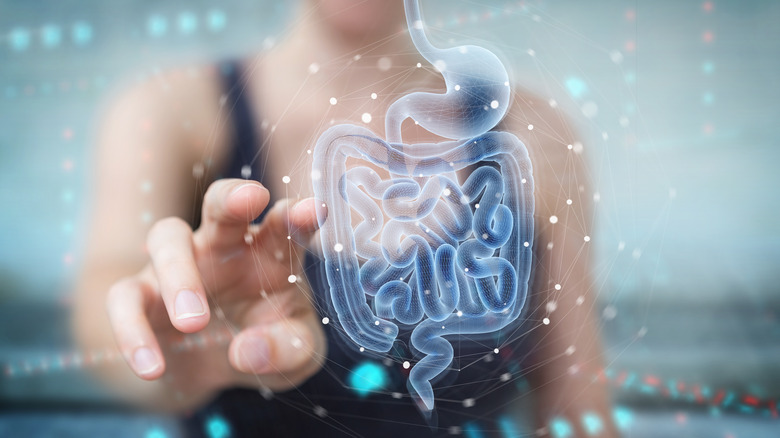The Surprising Way Gut Health Can Link To Anxiety And Depression
Gut health refers to your entire digestive system's bacteria, also called your gut microbiome, a complex system made up of 300 to 500 bacterial species, 10 times more than that of all your body's cells. Your gut microbiome helps you get nutrients you need from the foods you eat and is linked to health all over your body, including your mental health, not just your digestive system's health (via a 2013 study published in Gastroenterology & Hepatology). Gut health also links to anxiety and depression.
It's normal to feel some anxiety some of the time, such as when you're giving a presentation or getting ready for a test, per the National Institute of Mental Health. However, feelings of anxiety begin to interfere with daily life for people with an anxiety disorder. Anxiety can affect every aspect of a person's life, from work to school to house chores. There are several different types of anxiety disorders, from panic disorder to post-traumatic stress disorder. If you have an anxiety disorder, you may experience anxiety or panic attacks.
Depression is a mood disorder that can also affect everything in your life and impede your daily life. There are several types of depression disorders, from bipolar disorder to postpartum depression to psychotic depression. Symptoms of depression are vast and include feeling empty and persistently sad to feeling worthless, and having trouble sleeping (via the National Institute of Mental Health).
Gut health and mental health links
In his YouTube video, Dr. Eric Berg, DC, points out that anxiety and depression are linked to your gut health, pointing out that 90% of your serotonin is made in your gut, and antidepressants called SSRIs (selective serotonin reuptake inhibitors) affect serotonin. According to the Hormone Health Network, serotonin is a hormone that regulates your mood and happiness, and it affects your entire body. Low serotonin can lead to depression and anxiety.
Dr. Berg says SSRIs and other antidepressants can inhibit healthy bacteria growth, alter microbes, and increase inflammation. Your gut also makes dopamine, GABA, and B vitamins, and there's a link between mood disorders and low B vitamins. In addition, your gut has the second largest number of nerves, with your brain having the most. So everything that happens in your gut affects what goes on in your brain.
Dr. Berg recommends improving your gut health by taking a probiotic, eating fermented vegetables, and practicing fasting. Fermented vegetables include pickles, kimchi, sauerkraut, carrots, beets, and many more. Kefir (a fermented dairy product) and yogurt can also help improve gut health. Try adding these foods and a good probiotic supplement to your diet and see how it affects your anxiety and depression.


